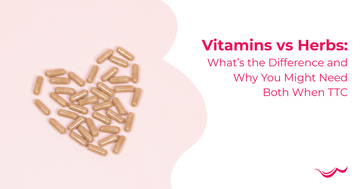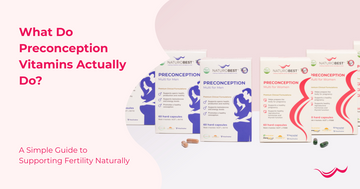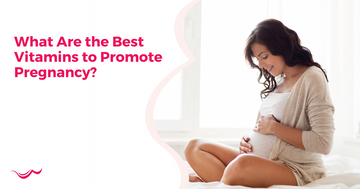3 Nutritional Supplements to Reduce Oestrogen Dominance
by Renee Grandi on Feb 01, 2022

High oestrogen levels can impact woman's health and fertility. High oestrogen levels may increase the risk of blood clots, PMS, mood swings, tender breasts and inflammation! Let's take a look at 3 nutritional supplements that can improve oestrogen detoxification and support the body as a whole.
DIM
DIM stands for 3,3′-diindolylmethane and is a plant chemical extracted from cruciferous vegetables. This molecule has been shown to exhibit anti-cancer, anti-inflammatory, oestrogen balancing and detoxification activities <14> <15>.
Endometriosis is an oestrogen dominant inflammatory disease. Oestrogen is responsible for cell growth and endometrium tissue production. Endometriosis is not the endometrium but endometrial LIKE tissue growing in abnormal locations outside of the uterus. Excessive oestrogen can impact a woman’s body and can be increased in a myriad of ways.
This may by through increasing stress and dietary deficiencies. Through increasing inflammation, environmental toxins/oestrogens, synthetic hormones, immune dysfunction and in particular for endometriosis – abnormal endometrial like tissue.
Accumulating evidence has demonstrated an association between endometriosis and abnormal progesterone signalling. Unfortunately, endometriosis is complex but we must make sure your hormones are communicating healthily.
Our hormones are intricately intertwined with many different biological interactions. We want the ovaries, brain and endometrial tissues to be corresponding correctly. Hormones will also impact the abnormal endometriosis tissue and lesions.
Food sources (think green and leafy!): broccoli, kale, cauliflower, brussel sprouts, cabbage, collard greens, watercress, and mustard greens. * Do not take DIM when on any type of contraception, unless advised by a health professional.
Probiotics
Endometriosis is a very complex condition, with a multitude of potential underlying factors – which is why it must be treated holistically. Research suggests that the gut microbiome is a major component. The gut microbiome plays a role in regulating abdominal tissues due to its strong association with the immune system.
The gut microbiome plays a large role in immune regulation. 70% of your immunity is thought to be regulated in the gut. Without a healthy gut microbiome, your body can suffer systemically.
It can suffer in nearly all aspects of health. Endometriotic lesions are often activated with over-stimulation of the immune system.
If you’ve been diagnosed with retrograde menstruation it can cause some problems. It can cause compounds to enter places they shouldn't around your pelvic region. These compounds could be menstrual blood debris, tissue fragments, iron and other inflammatory compounds.
Probiotics may help to reduce these processes by regulating associated inflammatory responses <18>. A healthy microbiome is critical to supporting endometriosis holistically <19>.
Digestive issues like bloating, gas, digestive pain, loose bowel movements and food intolerances can increase pain with endometriosis <20>. Digestion can be improved with the right probiotic supplements. There is a strong connection relating digestion, chronic inflammation and endometrial and endometrial like tissue. A healthy gut should be a high priority in your healing process.
Listen to your body – what are your triggers? Probiotics are excellent to support inflammation, immunity, digestion, mood and oestrogen metabolism <21>. If you’ve had anti-biotics or suffer from recurring thrush or urinary tract infections, this could indicate an imbalance. You could add in some healthy microbes to nourish your body through correct probiotic supplementation.
These great little microbes are safe and can do a world of benefit to your health. Look for a good quality probiotic with a minimum of 30 billion CFU’s.
It is best to speak with your consultant about specific probiotic strands for you). You can get an abundance of healthy bacteria from fermented foods! It’s super easy to make your own – why not try with your friends or family?
Food sources: Kimchi, sauerkraut, miso soup and kombucha (careful that it isn’t too sugary). Kefir, plant-based kefirs, tempeh and apple cider vinegar (with the mother) are other examples of probiotic rich foods.
Adding these foods to your meals can improve fat and protein digestion. This is because the acidity can improve digestive secretions and available enzymes to breakdown your food. Win-Win!
B-vitamin complex
B-vitamins are pretty much required for every single metabolic function in your body – wowza! They are essential for energy production, fat/carbohydrate/protein metabolism, cellular growth, DNA and neuro-transmitter production.
A B-complex can help support healthy liver detoxification. It can also help ensure your body has all the required nutrients to support its natural processes, especially for oestrogen metabolism. B-vitamins are essential to Phase 1 and 2 detoxifications within the liver.
If you’re depleted in the B’s, oestrogens can become re-circulated and we don’t want that! If you’re on a contraceptive, research indicated you’re more susceptible to being depleted in B-vitamins, particularly B6, folate and B12 <12>. Therefore, this can create a problem.
These nutrients are important for a multitude of reactions. Specifically for healthy blood and neuro-transmitter formation. Hence yet another reason why you can feel a bit mentally and emotionally unwell when you’re depleted.
If you’re bleeding heavily or anaemic, taking an active form of B-vitamins with high bioavailability may considerably help you. Even more so if you’re vegan or vegetarian as Vitamins B6 & B12 are only derived from animals. It is vital that you are getting your required B-vitamins to ensure healthy DNA processes. Your red blood cells rely heavily on nutrients to make healthy an endometrium lining <13>.
Food sources: You will find B-vitamins in an abundance of fruits and vegetables. Particularly green leafy vegetables, nuts, seeds, legumes, beans, grains, eggs and dairy products. So there you have it! 3 excellent supplements to help balance your hormones, nourish your endometrial lining, improve overall health and immunity.
References
<1> Encyclopædia Britannica, Artist, Uterus.
<2> F. S. a. A. S. o. Reproductive, Artist, Staging of Endometriosis.
<3> K. R. O. K. S. M. F. H. &. S. M. Netsu, "Oral eicosapentaenoic acid supplementation as possible therapy for endometriosis," Fertility and Sterility, vol. 90, no. 4, p. 1496–1502, 2008.
<4> M. R. J. K. F. A. I. J. H. &. J. E. S. Hopeman, " Serum Polyunsaturated Fatty Acids and Endometriosis.," Reproductive Sciences, vol. 22, no. 9, p. 1083–1087, 2014.
<5> D. Lane, "Bioavailability and Potential Uses of Vegetarian Sources of Omega-3 Fatty Acids: A Review of the Literature.," Critical Reviews in Food Science and Nutrition., 2013.
<6> N. M. A. A. G. A. S. V. R. A. Khanaki, "Evaluation of the Relationship between Endometriosis and Omega-3 and Omega-6 Polyunsaturated Fatty Acids," Iranian Biomedical Journal, pp. 38-43, 2012.
<7> A.-R. S. &. R. M. (. Mohd Mutalip, "Vitamin E as an Antioxidant in Female Reproductive Health.," Antioxidants, vol. 7, no. 2, p. 22, 2018.
<8> S. N. K. B. A. E. &. A. Z. Hashemi, "The effects of vitamin E supplementation on endometrial thickness, and gene expression of vascular endothelial growth factor and inflammatory cytokines among women with implantation failure," The Journal of Maternal-Fetal & Neonatal Medicine, pp. 1-8, 2017.
<9> G. d. A. F. O. d. A. A. Z. C. R. L. J. J. A. A. &. N. P. A. Da Broi, "Increased concentration of 8-hydroxy-2′-deoxyguanosine in follicular fluid of infertile women with endometriosis.," Cell and Tissue Research,, vol. 366, no. 1, p. 231–242.
<10> K. N. M. A. D. C. &. P. S. Santanam, "Antioxidant supplementation reduces endometriosis-related pelvic pain in humans.," Translational Research, vol. 161, no. 3, p. 189–195, 2013.
<11> T. E. S. M. O. M. J. K. L. L. …. S. N. Yamagata, "Retinoic acid has the potential to suppress endometriosis development.," Journal of Ovarian Research, 8(1). , 2015.
<12> T. H. P. P. &. S. S. McArthur, "Biological Variability and Impact of Oral Contraceptives on Vitamins B6, B12 and Folate Status in Women of Reproductive Age.," Nutrients, vol. 5, no. 9, p. 3634–3645, 2013.
<13> S. A. V. A. &. C. G. Palmery, "Oral contraceptives and changes in nutritional requirements," European Review for Medical and Pharmacological Sciences, vol. 17, pp. 1804-1813, 2013.
<14> Y. R. F. N. Y. L. K. Y. &. W. T. Liu, "Dose-Dependent Responses of I3C and DIM on T-Cell Activation in the Human T Lymphocyte Jurkat Cell Line. International Journal of Molecular Sciences,," vol. 18, no. 7, p. 1409. , 2017.
<15> L. P. J. &. M. S. Maruthanila, "Attenuation of Carcinogenesis and the Mechanism Underlying by the Influence of Indole-3-carbinol and Its Metabolite 3,3′-Diindolylmethane: A Therapeutic Marvel.," Advances in Pharmacological Science, 2014.
<16> G. S. &. Y. S. Chhabra, "Primary Dysmenorrhea and Serum Magnesium In Young Girls A Pilot Study," Journal of Gynecology, vol. 1, no. 3, 2017.
<17> D. M. M. P. P. Parazzini, "Magnesium in the gynecological practice: a literature review," Magnesium Research, vol. 30, no. 1, pp. 1-7, 2017.
<18> N. F. A. M. H. M. H. K. M. M. H. &. K. J. Khan, "Molecular detection of intrauterine microbial colonization in women with endometriosis.," European Journal of Obstetrics & Gynecology and Reproductive Biology, vol. 199, pp. 69-75, 2016.
<19> H. C. E. F. E. E. &. C. G. Leonardi, "Endometriosis and the microbiome: a systematic review.," BJOG: An International Journal of Obstetrics & Gynaecology., 2019.
<20> R. B. E. P. V. L. B. M. &. O. B. Ek, "Gastrointestinal symptoms among endometriosis patients—A case-cohort study.," BMC Women’s Health, vol. 15, no. 1, 2015.
<21> W. &. M. M. D. Laschke, "The gut microbiota: a puppet master in the pathogenesis of endometriosis?," American Journal of Obstetrics and Gynecology, vol. 215, no. 1, p. 68.e1–68.e4., 2016.
<22> F. Y. C. G.-C. Q. L.-Q. F. C. &. C. L.-H. Fan, "Effects of coenzyme Q10 supplementation on inflammatory markers: A systematic review and meta-analysis of randomized controlled trials," Pharmacological Research, vol. 119, pp. 128-136, 2017.
<23> C. S. C. C. S. C. W. W. &. Y. J. Chou, "Mitochondrial dysfunction induced by high estradiol concentrations," Endocrine Society , 2019.
<24> A. C. Y. H. P. B. Z. E. Z. C.-J. …. Z. G.-B. Qazi, "Selenium, Selenoproteins, and Female Reproduction: A Review.," Molecules, vol. 23, no. 12, p. 3053, 2018.
Written by: Renee Grandi, Nutritionist & Naturopath
About Renée Grandi | Women’s Health Expert




